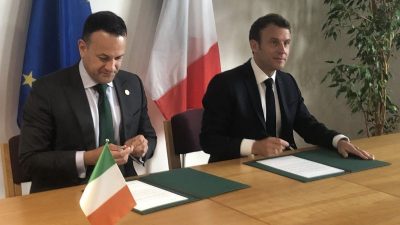France and Ireland Tap up EU for €667 Million to Build Massive Energy Power Link

The leaders of France and Ireland asked European Commission boss Jean-Claude Juncker on Tuesday (28 May) to back their request for over half a billion euros in energy project funding, which would be earmarked to ‘Brexit-proof’ Ireland’s power needs.
French President Emmanuel Macron and Irish Prime Minister Leo Varadkar have pushed forward with the next stage of a massive energy project that will link the island of Ireland to mainland Europe.
In a joint letter to Juncker, the two leaders revealed that they will ask the EU’s Innovation and Network Executive Agency (INEA) for €667 million to subsidise the project and requested the Luxemburger’s support.
“The project could serve as an excellent example of close cooperation between member states, with the aim of strengthening our connectivity, our solidarity as well as our ambitions for a more sustainable future,” the letter reads.
“Your support for this application would […] enable the project’s funding plan to be finalised and would guarantee its full implementation as quickly as possible,” it added.
Macron and Varadkar met ahead of an informal dinner in Brussels and EU diplomats suggested that energy policy was not the only conversation topic, given the meeting’s purpose of discussing the EU’s top jobs for the next five years.
Brexit shock
A power link between Ireland and the mainland has been mooted for years and in early May the two regulators involved in the project gave it the green light.
The 500km cable from Brittany to the south of Ireland, which has a price tag of €900 million, would be capable of transmitting 700MW of electricity, enough to power half a million homes and would also carry a fibre-optic link.
It would also be Ireland’s only non-UK electricity link and with Brexit currently scheduled for 31 October, Macron and Varadkar said the cable is “hugely important” and would allow Ireland to be integrated into the EU electricity market.
“The project will improve security of supply and reduce the carbon content in the two countries’ electricity mixes, by incorporating greater quantities of renewable energy,” the letter adds.
Grid regulators EDF and EirGrid agreed to a cost-sharing pact that means their contributions will not exceed the benefits they gain from it. As a result, Macron and Varadkar say that the requested subsidy is “of paramount importance” to stick to that agreement.
Ireland is expected to cover 65% of the outstanding costs, with France providing the other 35%.
The Celtic Interconnector has been listed as a Project of Common Interest since 2013 and is therefore eligible for EU funding. In July 2017, the Commission agreed to contribute €4 million for preliminary studies into the cable’s viability.
Current projections say the project could be completed by 2026 and would mark a massive contribution to both countries’ energy interconnection targets, which stand at 15% for 2030.
That means that countries have to be able to transmit at least 15% of the energy they generate across their borders, a goal that is meant to help build a single energy market for Europe. There is also a 10% target for 2020.
*
Note to readers: please click the share buttons above or below. Forward this article to your email lists. Crosspost on your blog site, internet forums. etc.
Featured image: Irish PM Leo Varadkar (L) and French President Emmanuel Macron (R) sign a joint letter to Jean-Claude Juncker on Tuesday. [Photo: Twitter]

